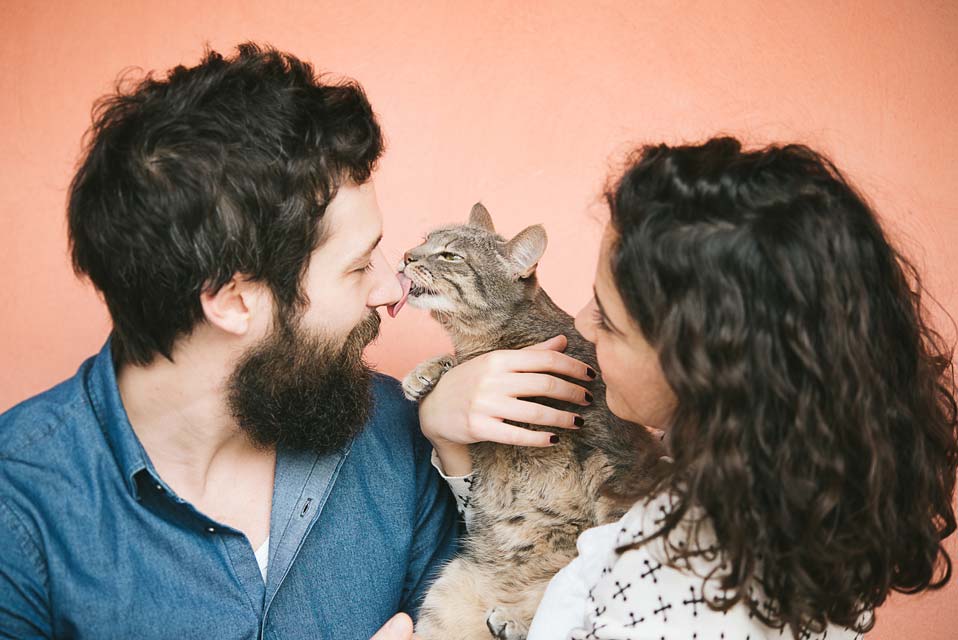Why Does My Cat Lick Me?

Do you have a kitty that likes to lick your hands, arms, or feet? While it's not as common for cats to engage in licking as it is for dogs, some cats are prone to doing it. Here's why.
Some Cats Lick for Attention
Sometimes a cat will give her owner a lick in an attempt to get some attention. She might want you to pet, play with, or feed her. If you ignore this type of licking, the kitty might get more insistent and give you a little nip with her teeth.
Some Cats Try to Groom You
When cats live together, they often groom each other. Sometimes, one cat appears to be the one "elected" to groom all the others. Self-grooming or grooming another cat helps keep the fur and skin healthy by stimulating good blood flow, redistributing skin oils, removing tangles and loose hair, and even getting rid of external parasites.
So a cat that routinely licks you might just consider you as part of her group and think it's her responsibility to help keep your skin clean and parasite-free.
You Might Taste Good
A cat might lick you if she smells something good on your skin. That could be lotion, soap, food, or another animal. This type of licking is usually sporadic, and you might be able to narrow down the smell or taste your cat is after and eliminate it.
Why Are Cats' Licks So Rough?
When a cat licks you, you will quickly find that their tongue is rougher than that of a dog. The reason for this is that cats' tongues are barbed. They're meant for removing fur and flesh from the bones of prey and aiming it toward their throats.
Can Licking Be a Problem for a Cat?
If your cat seems to be obsessive about licking, whether it's you, themselves, or some object, it could indicate a problem. For example, anxiety can result in OCD-like licking behavior in some cats, and that can be the case no matter what or whom they are licking. And over-grooming of their own body might indicate a medical problem like parasites or allergies.
It's important to evaluate your cat's licking in conjunction with other body language. Is her demeanor calm and happy while she's licking or does she seem tense and driven to lick?
If you think your cat's licking—of you, herself, or some object—is obsessive, contact your vet right away for an exam and a consult.
If your cat licks you for a few seconds and then bites you or bites after you've been petting her for a few minutes, this article might help you understand and curb the behavior: "Love Bites or Softening You up to Eat?"
How to Stop Your Cat from Licking You
If you don't like it when your cat licks you, you can train her to stop (once a medical or anxiety problem is ruled out).
Though it might be tempting for you to use some type of negative reaction such as putting something that tastes bad on your skin or telling your cat "no," it's probably best to avoid it. She might associate those types of negative consequences with you, and it could damage your relationship. Remember, your cat is most likely licking you because she's fond of you and wants to show it.
Instead, consistently redirect your kitty when she licks you. Remove the body part from her reach if possible and simultaneously present something more acceptable. For instance, you can begin petting her to redirect her attention or toss a toy away from yourself to start a play session, which will actually make her feel happy and bond the two of you closer. That's likely what she's after by licking you in the first place.
You May Also Like These Articles:
"Love Bites" or Softening You up to Eat?
Does Your Cat Have Separation Anxiety?
Common Cat Behavior Problems and How to Solve Them: Slideshow
Will Cats Always Land on Their Feet?
6 Famous Cats (or Groups of Cats) in History
Why Does My Cat Put Her Rear End in My Face?




